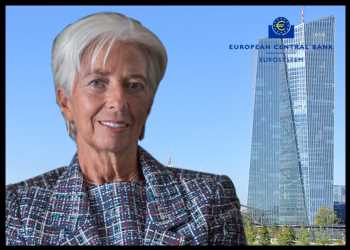Lagarde Signals More ECB Rate Hikes As Eurozone Inflation To Stay High

European Central Bank President Christine Lagarde said there will be more interest rate hikes in future, at a steady pace, as the euro area is expected to undergo a shallow recession and inflation in the single currency bloc is set to remain uncomfortably high for a long time.
“We decided to raise interest rates today, and expect to raise them significantly further, because inflation remains far too high and is projected to stay above our target for too long,” Lagarde said in her introductory statement to the post-decision press conference.
The ECB slowed the pace of its policy tightening on Thursday, as expected, by opting to hike interest rates by 50 basis points, after it had raised them by 75 basis points each in the previous two meetings in September.
The ECB has raised rates by 250 basis points this year, which is the fastest pace of monetary tightening in the central bank’s history, to rein in the runaway inflation.
While the ECB matched the Federal Reserve’s move a day earlier, Lagarde said the central bank for the 19-nation single currency area has more ground to cover and longer to go.
“We are in for a long game,” Lagarde said in response to questions from reporters.
The main refinancing rate, or the refi, was raised to 2.50 percent, the deposit facility rate to 2.00 percent and the marginal lending rate to 2.75 percent.
The ECB was widely expected to slow the pace of monetary policy tightening this time after inflation came off slightly in several countries on the back of a modest easing in energy prices, leading to a rebound in confidence indicators.
ECB policymakers expect to raise rates further based on the substantial upward revision to the inflation outlook.
“The Governing Council judges that interest rates will still have to rise significantly at a steady pace to reach levels that are sufficiently restrictive to ensure a timely return of inflation to the 2 percent medium-term target,” the ECB said.
Drawing attention to the part of the statement – ‘significantly at a steady pace’, Lagarde said the bank expects to raise interest rates by 50 basis points for a period of time.
“The ECB is not pivoting,” she said, adding that “we are not slowing down.”
The forecast for a “short-lived and shallow” recession in Eurozone during the first two quarters of next year, could be damping the ECB’s aggressiveness.
ING economist Carsten Brzeski expects the bank to raise rates by at least 100 basis points in the first quarter of next year. The economist said a final 50 basis points hike in the second quarter cannot be ruled out.
“While other major central banks made a slight dovish shift this week, the European Central Bank staged a hawkish pivot,” Brzeski said. “While the eurozone economy is probably still the hardest hit of all major economies by the current energy prices and supply chain frictions, it has the central bank with the strongest determination to bring monetary policy into restrictive territory,” the economist added.
In the latest set of macroeconomic projections, released Thursday, the ECB Staff substantially raised the euro area inflation outlook, while the growth forecasts were downgraded.
Eurozone inflation projection for this year was raised to 8.4 percent from 8.1 percent in September. The outlook for next year was sharply lifted to 6.3 percent from 5.5 percent.
The forecast for 2024 was also raised steeply to 3.4 percent form 2.3 percent. The inflation rate is seen easing to 2.3 percent in 2025, to come closer to the 2 percent target.
Core inflation, which excludes the volatile prices of food and energy, is projected to peak at 4.2 percent next year.
The ECB staff raised the euro area growth projection for this year to 3.4 percent from 3.1 percent. However, the forecast for next year was cut to 0.5 percent from 0.9 percent.
The outlook for 2024 was retained at 1.9 percent and Eurozone is seen expanding 1.8 percent in 2025.
Lagarde said job creation is likely to slow and unemployment could rise over the coming quarters, as the economy slows. The ECB staff projections showed wages growing at rates well above historical averages and pushing up inflation throughout the projection period, the ECB chief noted.
The ECB announced its initial quantitative tightening plans and said it will trim its asset purchase program portfolio. Starting March 2023, the APP asset holdings would decline at a measured and predictable pace, which is EUR 15 billion per month at least till the end of the second quarter, as the bank would stop reinvesting the principal payments from maturing securities.
Responding to queries on regulating cryptocurrencies in the aftermath of the collapse of the cryptoexchange FTX, Lagarde stressed on the need for regulation and supervision for the crypto assets space.
Source: Read Full Article
